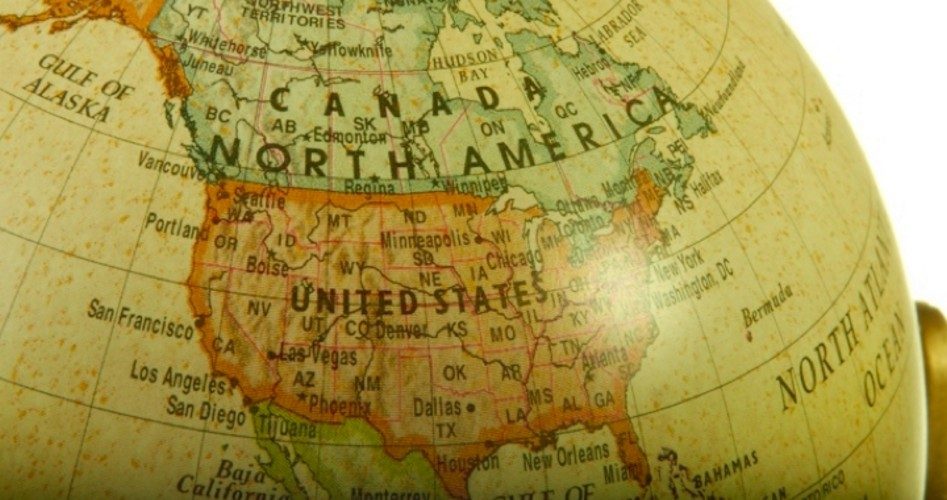
As the so-called trilateral North American “integration” process marches onward toward an ever-closer union between the governments of Canada, the United States, and Mexico, national law enforcement agents are slowly creeping across borders through a variety of shadowy schemes. Going forward, that trend is set to accelerate, according to officials, who say government functionaries may soon be able to chase and arrest suspects outside of their own nations. But critics of the controversial plan are fighting back with increasing urgency.
U.S. and Canadian authorities have already spent millions of dollars on “pilot projects” seeking to blur national borders in the field of policing. Almost 150 so-called “cross-border” officers have been trained so far, according to a report published this month by Embassy magazine. Meanwhile, the Shiprider program — officially known as “Integrated Cross-border Maritime Law Enforcement Operations” — has been active since 2009, when high-ranking bureaucrats from the United States and Canada signed the agreement without even obtaining legislative approval.
“Shiprider removes the international maritime boundary as a barrier to law enforcement by enabling seamless continuity of enforcement and security operations across the border, facilitating cross-border surveillance and interdiction, and serving as both a force multiplier and, potentially, as a model for other U.S./Canadian cross-border (integrated) enforcement and security initiatives,” the Royal Canadian Mounted Police (RCMP) says about the scheme on its website.
Under the highly controversial but little-known program, boats staffed by law-enforcement agents from both governments can scurry back and forth as if there was no border between the two nations. And in March, top Obama administration officials met with their Canadian counterparts to super-charge the unconstitutional process by signing even more “agreements” — again without consulting Congress, let alone ratifying a treaty.
“We will continue to work with Canada to further enhance information sharing and integrate our cross-border law enforcement operations, strengthening the national and economic security of both our nations,” claimed Homeland Security Secretary Janet Napolitano after signing a deal to advance the process with Canadian officials. Her counterparts across the border issued similar statements following the meeting.
Disgraced Attorney General Eric Holder — currently being threatened with contempt of Congress charges for covering up and lying about the administration’s deadly “Fast and Furious” gun-trafficking scandal — also touted “integrated law enforcement” as a “key pillar” of what critics consider to be a subversive scheme. In a press release posted by the Canadian government following an agreement, the scandal-plagued Justice Department boss said he was “grateful” to his counterparts in Canada for their work to “strengthen the critical ties that bind our nations together.”
The Defense chiefs from the governments of Mexico, Canada, and the United States also met earlier this year and signed their own deals to integrate the three militaries and discuss ways to expand the use of the armed forces in continental law-enforcement operations. “We know that transnational threats require transnational responses,” the three claimed in a joint statement. “With this in mind, we have agreed to enhance our cooperation to support efforts to counter transnational criminal organizations and to respond to natural disasters in the hemisphere.”
But those latest agreements, while significant, were just small pieces of Obama’s momentous and almost certainly unconstitutional “Beyond the Border” plot with Prime Minister Stephen Harper, signed early last year with almost no mention by the establishment press. And that scheme merely builds upon a process that has been ongoing for many years. But in the realm of law enforcement, the “integration process” is moving forward quickly, and critics — though not the mainstream media — are paying attention.
While even the Canadian government acknowledged that the early phases of the cross-border policing plot have stirred significant controversy — particularly among activists concerned about national sovereignty and civil liberties — at least two top law enforcement officials promised to continue marching onward with the broader plan. However, it will be accomplished in “baby steps” to get people acclimated to the idea, they said.
When questioned in Canadian Parliamentary hearings about a proposed law legalizing and expanding cross-border police integration in North America, senior RCMP officials promised to take it slowly. But if anti-national sovereignty zealots get their way, American FBI and DEA agents may soon have permission to arrest Canadians in Canada, while RCMP officials would purportedly acquire the power to arrest U.S. citizens on American soil. U.S. officials might even be able to conduct aerial surveillance over Canada, according to reports.
“We recognized early that this approach would raise concerns about sovereignty, of privacy, and civil liberties of Canadians,” RCMP Chief Superintendent Joe Oliver told the Canadian Senate Committee on National Security and Defense earlier this month. “We said ‘Let’s take baby steps, let’s start with two agencies to test the concept, let’s demonstrate to Canadians and Americans that such an approach might work.”
Apparently “baby steps” was not Oliver’s own phrase, as RCMP deputy commissioner for federal policing Mike Cabana used it during the same hearing as well. “First of all, the discussion started with respect to marine environments. And secondly, baby steps,” he told lawmakers, referring to schemes aimed at abolishing the border for law enforcement purposes. According to Cabana, the marine plot “was seen as probably the most logical place to start to explore the possibilities.”
Prominent critics, however, are sounding the alarm — especially in light of the latest developments. “Ok, this is truly absurd. DEA, FBI, NCIS [Naval Criminal Investigative Service] agents authorized to arrest Canadians in Canada?” wrote attorney and media commentator James Morton, former president of the Ontario Bar Association. “I’d say it’s a bad parody by extremist Canadian nationalists … except it’s real legislation in Parliament right now.”
While the scheme to erect a “North American Union” was at one time dismissed by members of the establishment as a “conspiracy theory,” those supposed “analysts” and “experts” have now been completely discredited. It is neither a conspiracy — it is mostly out in the open for those who care to look — nor a theory, at this point at least. It is happening.
A U.S. embassy cable released by WikiLeaks last year confirmed conclusively what had long been suspected: Extremist anti-national sovereignty elements within all three governments have been collaborating, largely in the shadows, to create a supranational regime along the lines of the unpopular entity now ruling over Europe. Now it just happens to be more obvious as it proceeds in public.
If proponents of “integration” get their way — which at this point remains uncertain, as opposition continues to grow and lawmakers have never consented to anything of the sort — “North America” will be ruled by a new system. Some of the most radical proposals being pursued by advocates include a continental “Parliament” to legislate, an expansion of the North American court system originally developed under NAFTA, and even a new transnational currency.
Shadowy bureaucrats and top officials are working fiendishly behind the scenes and in the open to bring the highly controversial schemes to fruition. Supporters of national sovereignty, the U.S. and Canadian constitutions, and individual liberty, on the other hand, are working hard to stop it, with opponents of “integration” saying the plot is illegitimate on its face — and could even be considered treasonous. But as the plan to virtually abolish national sovereignty moves forward and the public begins to understand its implications in the coming months and years, the battle is likely to intensify.
Related Articles:
North American Union Moves Closer After Trilateral Summit
U.S. & Canada Agree to Common “Perimeter”
Defense Boss Panetta Touts “North America” After Canada Meetings
WikiLeaks Confirms North American Integration Scheme
U.S. Defense Department Announces Step Toward the North American Union



